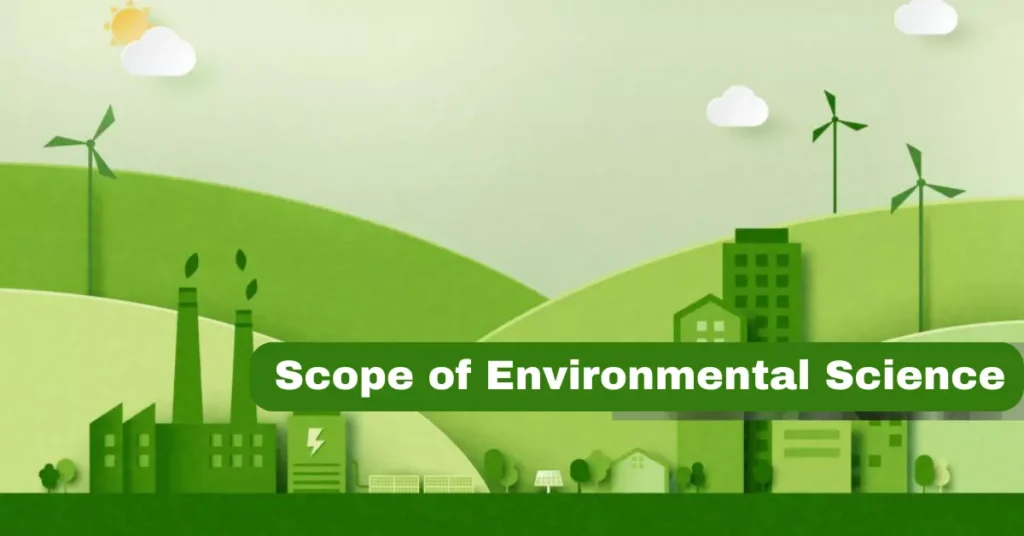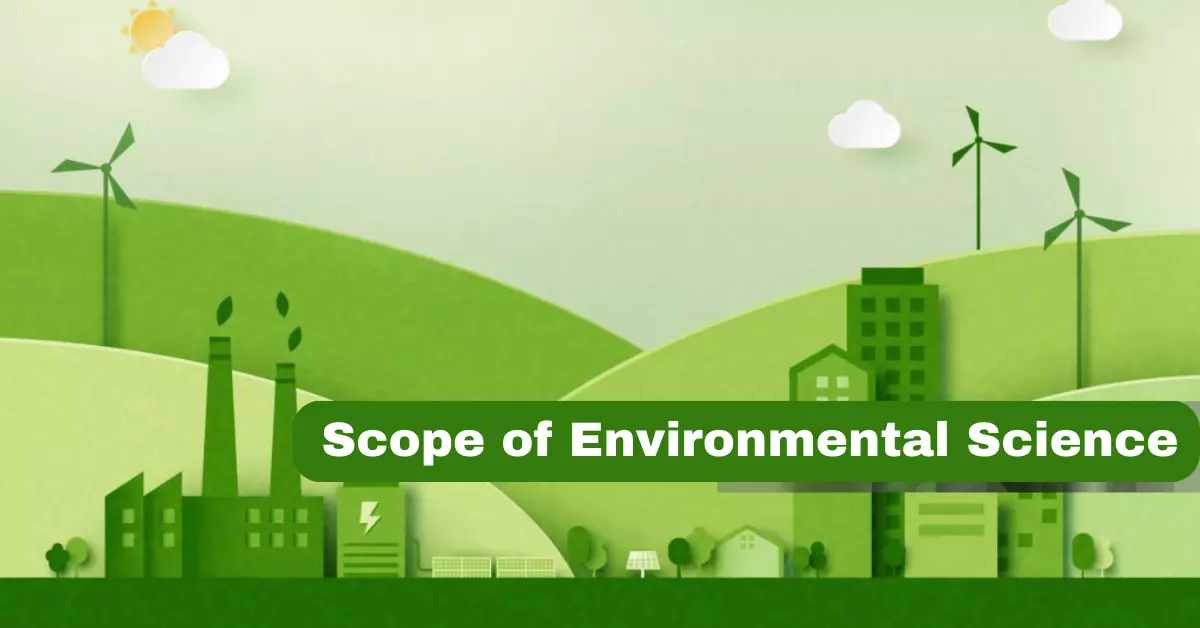What is the Scope of Environmental Science in Pakistan: Environmental science in Pakistan offers an expansive canvas of career possibilities in a world increasingly focused on sustainability. From understanding the ecosystem to tackling environmental challenges, this field holds promise.

Let us delve into the realm of possibilities, diverse career paths, and boundless opportunities that lie ahead for those driven by a commitment, to safeguarding and nurturing our precious planet.
Exploring Bachelor’s Program in Environmental Science
The Environmental Science Bachelors program provides a basis, for a career focused on comprehending examining, and addressing environmental challenges. Typically educational institutions such, as Lahore UBAS present a curriculum that covers subjects necessary for understanding the intricacies of our ecosystem.
Bachelor’s Program Overview:
The structure of the program typically combines both learning and hands-on application. It encompasses areas, including ecology, conservation biology, environmental policy, pollution management, and sustainable development. Students explore subjects, like climate change, biodiversity, and the management of resources obtaining an understanding of environmental systems.
Curriculum & Subjects:
The program’s courses typically include an array of topics such, as Environmental Chemistry, Ecology, Environmental Impact Assessment, Remote Sensing, Environmental Laws and policies, and other related subjects. These course offerings aim to provide students, with the knowledge and skills needed to tackle environmental challenges.
Eligibility Criteria and Admissions:
Many institutes have requirements, for admission. Usually, students who have a background, in science, biology, chemistry, or geography are eligible to apply for this program. The admission criteria may involve entrance exams, interviews, or selection based on merit.
Bachelor’s Program at Lahore-UBAS:
For instance, at Lahore-UBAS, the BS Environmental Science program combines theoretical understanding with hands-on experiences. It fosters critical thinking and problem-solving skills necessary to excel in the environmental sector.
This bachelor’s degree program equips students with a range of career opportunities, in the field of science setting the stage for a fulfilling and meaningful professional voyage.
Career Opportunities after Environmental Science Studies
After successfully earning a degree, in Environmental Science from Pakistan, a multitude of career prospects present themselves in sectors addressing the increasing demand, for sustainability.
Diverse Job Prospects in Pakistan:
Graduates discover that they are well prepared for positions, in government agencies, private industries, research organizations, nongovernmental organizations (NGOs), and various other sectors. The increasing emphasis on preservation and sustainable practices has led to a need for competent experts, in these fields.
Employment Areas and Sectors:
There are sectors, within the job market that encompass a range of industries. These include organizations focusing on policies and regulations private companies striving for sustainable practices, nongovernmental organizations dedicated to conservation efforts research institutions exploring innovative solutions, and educational institutions in need of educators.
Please read this: Scope of Educational Psychology: Complete Guide
Potential Career Paths:
After completing their studies graduates have opportunities to pursue careers in fields such, as Environmental Consulting, Sustainability Analysis, Conservation Science, Environmental Planning, Policy Analysis, Wildlife Biology, or Environmental Education. These roles allow individuals to contribute uniquely to environmental preservation while pursuing their interests.
Job Diversity and Impact:
Every profession presents obstacles and chances to create an influence. Whether it involves providing guidance on methods, for companies or conducting studies to preserve ecosystems there is a range of opportunities, for fulfilling work.
Continued Growth and Evolution:
Moreover, the field of studies is constantly evolving, providing opportunities, for specialization and advancement. Given the concerns surrounding climate change and environmental deterioration, there is a growing need, for competent environmental experts.
The changing nature of environmental science careers, in Pakistan offers an exhilarating field for graduates who are enthusiastic about making a positive impact, on the world while playing a vital role in conserving the environment.
Jobs and Roles in Environmental Science
The field of science encompasses a range of roles each playing a distinct part, in the preservation of the environment promoting sustainable practices, and implementing policies that support these efforts.
Various Roles and Responsibilities:
- Environmental Consultant: Advises businesses or government bodies on environmental regulations and sustainable practices.
- Sustainability Analyst: Evaluates and recommends strategies for organizations to operate in environmentally responsible ways.
- Conservation Scientist: Conducts research to protect natural resources and ecosystems.
- Environmental Planner: Develops plans to manage land use while considering environmental impact.
- Policy Analyst: Assesses policies’ environmental impact and proposes changes for sustainability.
- Wildlife Biologist: Studies animals and their habitats to aid in conservation efforts.
- Environmental Educator: Educates communities on environmental issues and sustainability practices.
Specific Job Types and Descriptions:
- Environmental Engineer: I develop solutions, for issues, such, as controlling pollution and managing waste.
- Meteorologist: Studies weather patterns and their impact on the environment.
- Ecologist: Explores relationships between organisms and their environments.
- Environmental Biologist: Focuses on studying living organisms and their interactions with the environment.
- Environmental Geologist: Studies the Earth’s materials and their impact on the environment.
Roles in Action:
Each role contributes uniquely; whether it’s designing eco-friendly technologies, conducting field research to conserve habitats, or influencing policies for sustainable practices, professionals in these roles actively contribute to a greener future.
Interdisciplinary Collaboration:
Environmental science roles often involve collaboration across disciplines. For example, an environmental consultant could collaborate with engineers, economists, and policy analysts to develop solutions.
Impact and Challenges:
While these positions provide an opportunity, for making a difference they also come with their set of challenges. These include finding a balance between interests and environmental conservation well as navigating through intricate policy frameworks.
Collectively these roles bring together a range of expertise that’s essential for tackling environmental challenges and moving towards a sustainable future not only in Pakistan but also, beyond its borders.
Key Professions in Environmental Science
The realm of environmental science encompasses various professions, each playing a pivotal role in understanding, preserving, and mitigating environmental challenges in Pakistan.
#1: Meteorologist:
Meteorologists study atmospheric phenomena, weather patterns, and their impact on the environment. In Pakistan, where weather fluctuations significantly affect agriculture and livelihoods, meteorologists play a crucial role in forecasting and understanding climate shifts.
#2: Ecologist:
Ecologists focus on understanding the relationships between organisms and their environments. In a country like Pakistan, rich in diverse ecosystems, ecologists study and protect these ecosystems, ensuring the preservation of biodiversity.
#3: Environmental Biologist:
Environmental biologists study how living organisms interact with their environment. Their research aids in understanding how human activities impact ecosystems and help devise strategies for conservation and sustainability.
#4: Environmental Engineer:
Environmental engineers design solutions to address environmental challenges. With Pakistan facing issues like water scarcity and pollution, these professionals develop technologies for cleaner air and water, waste management, and renewable energy systems.
#5: Environmental Geologist:
Environmental geologists study the Earth’s materials and their impact on the environment. In Pakistan, where geological features influence environmental processes, these professionals play a crucial role in assessing and managing natural resources.
Each profession within environmental science addresses unique aspects of environmental challenges in Pakistan, contributing significantly to preserving the country’s natural heritage while paving the way for sustainable development.
Salaries in Environmental Science

Salaries in environmental science vary based on factors such as job role, experience, location, and the specific industry or sector one works in. In Pakistan, the compensation in the field of environmental science is influenced by several dynamics.
Salary Range Overview:
Entry-level positions in environmental science might start at moderate salaries, typically ranging from [specific range] per month. However, with experience and specialization, salaries can significantly increase. Mid-career professionals with expertise often earn between [45000 – 500000] per month.
Factors Influencing Salaries:
- Job Role and Responsibility: Roles like environmental consultants or experienced engineers usually command higher salaries compared to entry-level positions.
- Experience and Expertise: Experience and specialized skills are rewarded in the field, leading to increased compensation.
- Industry and Sector: Salaries can vary between sectors. For instance, government roles might offer stability but moderate pay, while private sectors or multinational corporations might offer higher salaries.
- Geographical Location: Salaries can differ based on the city or region. Major urban centers might offer higher salaries due to higher living costs.
Trends and Growth:
The field of environmental science in Pakistan is experiencing steady growth, reflecting positively on salary trends. As awareness about environmental issues increases, so does the demand for skilled professionals, potentially leading to better compensation packages.
Potential for Growth:
With the rising emphasis on sustainability and environmental regulations, there’s significant potential for growth in this field. Professionals with advanced degrees, certifications, or a track record of successful projects can expect steady career advancement and higher salaries.
Overall, while salaries in environmental science in Pakistan might vary, the field holds promise for rewarding careers, especially for individuals passionate about making a positive environmental impact.
Read more: Scope of Bs Chemical Engineering in Pakistan: Perfect Guide
Universities Offering Environmental Science in Pakistan
Pakistan boasts several reputable institutions that offer Environmental Science programs, providing students with a robust education to tackle pressing environmental issues. Here are some notable universities offering Environmental Science programs:
#1: Lahore University of Management Sciences (LUMS):
- LUMS offers a comprehensive Bachelor’s program in Environmental Science, focusing on interdisciplinary approaches to environmental problem-solving.
#2: Karachi University:
- Karachi University provides Bachelor’s and Master’s programs in Environmental Science, emphasizing research and practical application in environmental studies.
#3: Quaid-i-Azam University, Islamabad:
- Known for its quality education, Quaid-i-Azam University offers Environmental Science programs at the undergraduate and postgraduate levels, preparing students for careers in environmental conservation and research.
#4: University of Agriculture, Faisalabad:
- This institution offers programs related to environmental sciences within the scope of agriculture, focusing on sustainable farming practices and environmental conservation.
#5: National University of Sciences and Technology (NUST):
- NUST offers Bachelor’s and Master’s programs in Environmental Sciences, emphasizing technological solutions to environmental challenges.
#6: University of Peshawar:
- The University of Peshawar offers Environmental Science programs aimed at providing students with a comprehensive understanding of environmental issues prevalent in the region.
#7: Government College University, Lahore:
- GCU Lahore provides undergraduate and postgraduate programs in Environmental Science, emphasizing research and practical applications in environmental studies.
These universities offer diverse programs that cover various aspects of environmental science, providing students with the knowledge and skills needed to address environmental challenges in Pakistan and beyond. Aspiring environmental scientists have a range of options to pursue their educational goals and contribute meaningfully to the field.
Path to Becoming an Environmental Scientist
Becoming an environmental scientist involves a deliberate path of education, skills development, and practical experience. Here’s a guide to pursuing a career in this field:
Educational Journey:
- Undergraduate Degree: Start with a Bachelor’s degree in Environmental Science or a related field like Biology, Chemistry, Geography, or Engineering. Programs vary but generally cover core environmental science topics.
- Advanced Studies: Consider pursuing a Master’s or Ph.D. for specialized knowledge and research opportunities. These degrees can open doors to leadership roles, research positions, or academia.
Skill Development:
- Technical Skills: Gain proficiency in data analysis, GIS (Geographic Information Systems), environmental modeling software, and laboratory techniques relevant to environmental science.
- Critical Thinking: Hone problem-solving and critical thinking skills to analyze complex environmental issues and propose effective solutions.
- Communication Skills: Develop strong communication skills to convey scientific findings, write reports, and engage with diverse stakeholders effectively.
Hands-on Experience:
- Internships and Research: Seek internships or research opportunities during studies to gain practical experience. This could be with government agencies, research institutions, or environmental organizations.
- Fieldwork Exposure: Fieldwork is integral; get hands-on experience in environments relevant to your interests, whether it’s forests, wetlands, or urban areas.
Networking and Professional Development:
- Join Professional Organizations: Become a member of associations related to environmental science to access resources, conferences, and networking opportunities.
- Stay Updated: The field is dynamic; stay abreast of the latest research, technological advancements, and policy changes through continued learning and professional development.
Career Paths:
Environmental scientists can explore various career paths, including research, consultancy, advocacy, education, policy-making, or specialized roles like environmental engineering or resource management.
By following this educational and experiential roadmap, aspiring environmental scientists can build a strong foundation and expertise to contribute meaningfully to environmental conservation and sustainability efforts.
Read also: BS Diet and Nutrition Scope in Pakistan: Career, Jobs and Saleries
Job Market and Career Prospects
The job market for environmental science professionals in Pakistan is evolving, offering a spectrum of opportunities driven by the growing awareness of environmental issues and sustainability concerns.
Market Dynamics:
- Increasing Demand: The heightened focus on environmental sustainability across industries, government initiatives, and public awareness campaigns has amplified the demand for environmental science professionals.
- Diverse Career Avenues: The job market is multifaceted, offering roles in government agencies, private corporations, NGOs, research institutions, academia, and consulting firms.
Trends Shaping Career Prospects:
- Sustainability Initiatives: Businesses and industries are integrating sustainable practices, creating roles for environmental scientists to advise on eco-friendly strategies and compliance with environmental regulations.
- Policy Emphasis: Governments are formulating and enforcing environmental policies, necessitating experts to assess impact and compliance, offering roles in policy analysis and formulation.
Key Growth Areas:
- Renewable Energy: With Pakistan’s focus on renewable energy sources, professionals in environmental science play pivotal roles in research, development, and implementation.
- Water Resource Management: Given water scarcity issues, there’s a demand for experts in managing water resources sustainably and addressing pollution concerns.
Challenges and Opportunities:
- Complex Problems: Environmental challenges are complex; thus, professionals need interdisciplinary skills to address issues effectively.
- Innovation and Research: The field offers opportunities for innovation, research, and technological advancements to mitigate environmental problems.
Future Outlook:
The future of environmental science careers in Pakistan appears promising. As the world’s attention on environmental sustainability intensifies, professionals in this field will continue to be in demand, playing a crucial role in shaping policies, implementing sustainable practices, and preserving the environment.
Aspiring environmental scientists can capitalize on this growing field, aligning their expertise and passions with the diverse opportunities offered by the evolving job market in Pakistan.
Essential Qualities and Skills
Becoming a successful environmental scientist in Pakistan requires a blend of specialized knowledge, technical skills, and personal attributes essential for navigating the complexities of the field.
Technical Competence:
- Scientific Acumen: A solid understanding of scientific principles, particularly in biology, chemistry, and ecology, forms the foundation of environmental science.
- Data Analysis: Proficiency in analyzing and interpreting data using statistical tools and software for comprehensive research.
- Technology Skills: Familiarity with GIS (Geographic Information Systems), remote sensing, environmental modeling software, and other technical tools for analysis and assessment.
Interdisciplinary Approach:
- Critical Thinking: Ability to evaluate complex environmental issues, anticipate outcomes, and propose effective solutions.
- Problem-Solving: Aptitude for identifying problems and devising innovative strategies to address environmental challenges.
- Adaptability: Flexibility to work across various fields within environmental science, adapting to diverse scenarios and challenges.
Communication and Collaboration:
- Effective Communication: Strong verbal and written communication skills to convey scientific findings, write reports, and engage with stakeholders.
- Collaborative Spirit: Capability to work in multidisciplinary teams, collaborating with professionals from diverse backgrounds.
Passion and Commitment:
- Environmental Advocacy: A genuine passion for environmental conservation and a commitment to making a positive impact.
- Ethical Responsibility: Upholding ethical standards and integrity in research, decision-making, and interactions within the field.
Continuous Learning:
- Curiosity and Learning Orientation: Eagerness to stay updated with the latest research, advancements, and trends in environmental science.
- Professional Development: Commitment to lifelong learning through courses, certifications, and professional development opportunities.
Resilience and Adaptability:
- Resilience: Ability to navigate challenges and setbacks inherent in environmental science, persisting in finding viable solutions.
- Adaptability: Readiness to adapt to evolving technologies, methodologies, and environmental policies.
Developing and nurturing these qualities and skills is fundamental for aspiring environmental scientists in Pakistan, enabling them to excel in a field that demands dedication, expertise, and a steadfast commitment to environmental preservation.
FAQs: Scope of Environmental Science in Pakistan
The “best” field in environmental science varies based on interests; options include conservation biology, environmental policy, sustainability, and ecological restoration.
Environmental scientists analyze data, conduct research, and develop solutions to environmental issues. They may work in fields like conservation, pollution control, or sustainability planning.
Countries like Norway, Switzerland, Germany, and Canada offer excellent prospects for environmental science due to advanced research, sustainability initiatives, and job opportunities.
Yes, environmental science is vital for addressing global challenges. Its future is crucial in finding sustainable solutions for a healthier planet.
A bachelor’s degree in environmental science or related fields like biology, chemistry, or ecology is commonly required for pursuing this field.
Physics isn’t always a strict requirement for environmental science, but it can be beneficial, especially in understanding environmental processes and phenomena.
